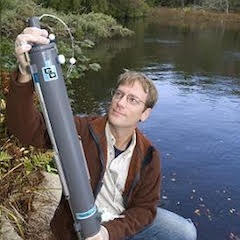You hear about mercury in seafood, but have you wondered where it comes from? I did, and that’s what lead me to connect with Dr. Carl Lamborg. Carl is one of the leading experts on mercury in the ocean.
Dr. Lamborg didn’t always know he wanted to be a marine scientist, however. In fact, he went to school for chemistry, and studied air pollution after graduation! It wasn’t until one fateful post-college internship under an oceanographer that he even considered the marine world. He dove right in, and eventually conducted some of his marine chemistry research at the renowned Woods Hole Oceanographic Institute.
Now Dr. Lamborg teaches marine science at the University of California, Santa Cruz, where he also conducts his mercury research. In today’s episode, Dr. Lamborg breaks down where mercury in our oceans comes from, how to test for it, and how it affects you.
Connect with Carl: website
Quick Links
University of Connecticut
Dissolving Gold with Mercury
Elemental mercury
Clair Patterson
Cold vapor atomic fluorescence spectrometry
UNOLS Ship Schedules
Coast Guard Cutter Healy
The Atlantic Explorer
Archaea
Tide pools
Anemones
Frigate birds
Pelicans
Carl’s ask: Monterey Bay Aquarium’sSeafood Watch Consumer Guide
Carl’s ask: NRDC Smart Seafood Buying Guide
Show Notes
Environmental chemistry is a thing? and I got a job doing it?! [2:15]
How do you monitor air pollution [3:17]
Squeamish but love science? Try chemistry over biology! [5:00]
Mercury spends its time in many different mediums [6:00]
How does mercury get into the air? Partially us, partially volcanoes! [7:00] Mercury gobbles gold [8:00]
Bioaccumulation- where does the mercury in the ocean even come from? [10:44]
Mercury is slowly removed from the atmosphere via oxidation [11:58]
It’s constantly raining mercury on our oceans [11:20]
Mercury has been around pre-humans, but we bring more (an outstanding research issue) [14:25]
Breaking Bad isn’t too far off from real life chemistry [17:30]
How to collect mercury samples from the ocean [20:10]
Mercury in the lighting in your home, office, or school [23:00]
Doing the reverse of what gold miners are doing [24:17]
Traveling in the name of ocean chemistry [26:00]
Network of oceanic research vessels [27:15]
Repercussions of lack of support for science- shrinking fleets [30:05]
Spending two months on an Arctic Ocean Cruise – [31:05]
Finding Santa in the North Pole in September [31:40]
Science takes you to places you wouldn’t have gone- and it’s magical [33:30]
Storms at sea [34:21]
The “hot topic” of oceanic mercury [36:15]
Humans, birds, lizards are all low-temperature fires [37:50]
Lots of unanswered questions with mercury processes in the ocean. One is how phytoplankton even absorb the mercury that works its way into the food web! [37:40]
Methylmercury is lipophilic – it likes to be inside living tissue [41:20]
Bioaccumulation v. biomagnification [42:40]
Your body has a hard time getting rid of methylmercury [44:50]
“If you are a fish eating person, you probably have a lot more mercury inside your body than a non-fish eating person” [45:25]
Eliminating mercury from your body [47:10]
Mercury in vegetarian v. not-so-avid fish eater [48:35]
Growing up land locked doesn’t mean you can’t be an ocean scientist! [50:50]
Favorite marine animal of an ocean chemist [54:20]
Learn the different concentrations of mercury in different kinds of fish [55:40]
